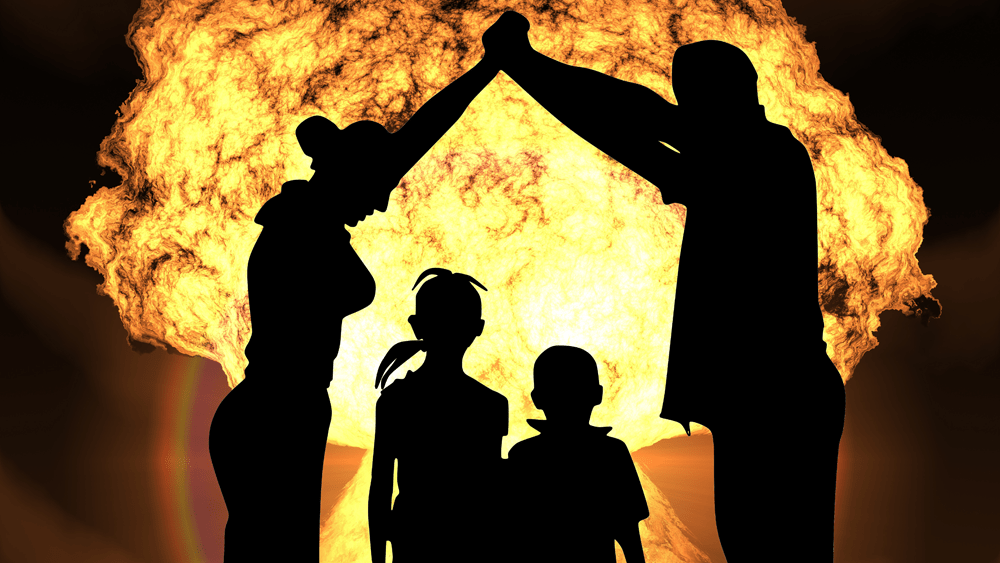Duck and Cover: How FEMA Wants Us to
Think about the Unthinkable
Karl Grossman / Shelter Island Reporter
(September 13, 2022) — Among the 100 booths at the wonderful Shinnecock Indian Powwow in Southampton on Labor Day weekend was a Federal Emergency Management Agency booth with a flier headed: “Be Prepared for a Nuclear Explosion.”
Amid the booths presenting beautiful arts and crafts done by Shinnecock and Native Americans from all over the US, and food vendors featuring Native American food, and the impressive singing and dancing of Native Americans in full regalia, there was this scary message.
“A nuclear weapon is a device that uses a nuclear reaction to create an explosion,” said the FEMA flier. “But,” it said, “you can keep your family safe by knowing what to do and being prepared if it occurs.
“Get inside the nearest building to avoid radiation … Remove contaminated clothing and wipe off or wash unprotected skin if you were outside after the fallout arrived,” it continued. “Family should stay inside. Reunite later to avoid exposure to radiation danger. Keep pets inside.”
Under a heading “Bright Flash,” it said that it “can cause temporary blindness for less than a minute.” Then there is the “Blast Wave” that “can cause death, injury and damage to structures several miles out from the blast.”
Then there would be “Radiation” — under which it was explained that it “can damage cells of the body. Large exposures can cause radiation sickness” — and then “Fallout,” which “is radioactive, visible dirt and debris raining down that can cause sickness to those who are outside.”
It went on and on, including advising: “Take a shower or wash with soap and water to remove fallout from any skin or hair that was not covered.”
I spent much of last year writing a book, “Cold War Long Island,” with Christopher Verga, who teaches Long Island history at Suffolk County Community College.
But this FEMA flier was not issued in the 1950s, a time when, where I went to elementary school, P.S. 136 in Queens, we were issued dog tags to wear so we could be identified in the event of a nuclear apocalypse, and regularly did “duck-and-cover” exercises, ducking under our desks.
But this was 2022, and the FEMA flier was relatively recent: It was dated August 2020.

The FEMA instructions followed, a few months back, the public service announcement aired by New York City Emergency Management’s office declaring: “So there’s been a nuclear attack … the big one has hit.” It then advised people, like the FEMA flier, of what to do.
With Russian President Vladimir Putin threatening the use of nuclear weapons with his invasion of Ukraine, nuclear war is very much back as a possibility.
Mayor Eric Adams justified the PSA saying “we’re going to be prepared.” Nothing wrong with being prepared. “Be Prepared” is the motto of the Scouts, and I was a Scout — an Eagle Scout.
But is humanity doing what we must to end the specter of nuclear war?
The Treaty on the Prohibition of Nuclear Weapons, an international agreement to abolish nuclear weapons, was adopted by the United Nations General Assembly in 2017 — with 122 nations in favor. Banned would be the development, testing, production, stockpiling, stationing, transfer, use and threat of use of nuclear weapons.
“Let’s eliminate these weapons before they eliminate us,” said U.N. Secretary-General Antonio Guterres.

The big problem: the so-called “nuclear weapons states,” notably the United States, Russia, China, France and the United Kingdom, have not signed on to the treaty.
Can the atomic genie be put back in the bottle? Anything people have done other people can undo. And the prospect of massive loss of life from nuclear destruction is the best of reasons.
There’s a precedent: the outlawing of chemical warfare following World War I by a series of treaties enacted after the impacts of nuclear weapons had been horrifically demonstrated.
Chris and I have been doing many presentations about our book — at the museum of the Suffolk County Historical Society in Riverhead; the Southampton History Museum; at libraries, last week at John Jermain Memorial Library in Sag Harbor, and this past Monday Hillside Public Library in New Hyde Park.
We are not only talking about the Cold War of the 1950s and 1960s, but a new Cold War which could easily turn into a hot nuclear war. The Treaty on the Prohibition of Nuclear Weapons must take full effect to prevent nuclear war — which in reality is not winnable and is suicidal.
As Secretary-General Guterres said: “Let’s eliminate these weapons before they eliminate us.”
Posted in accordance with Title 17, Section 107, US Code, for noncommercial, educational purposes.
